





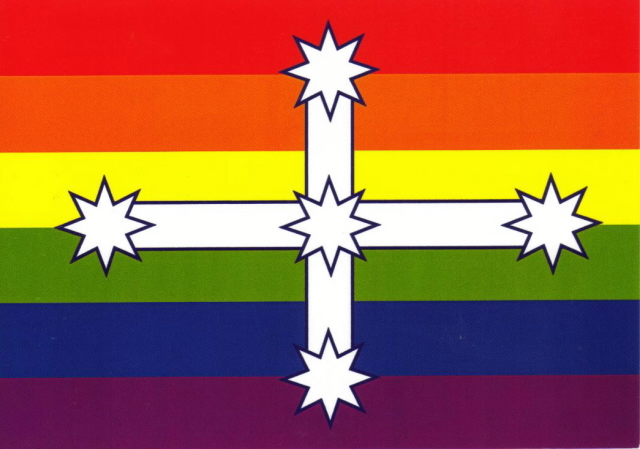
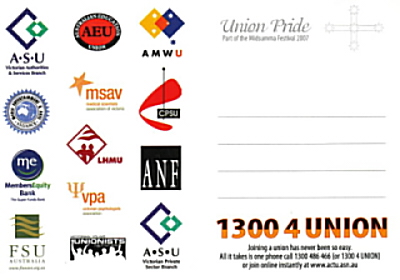

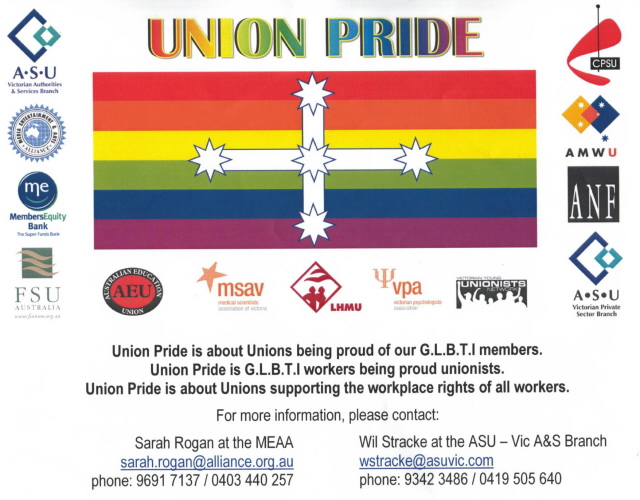

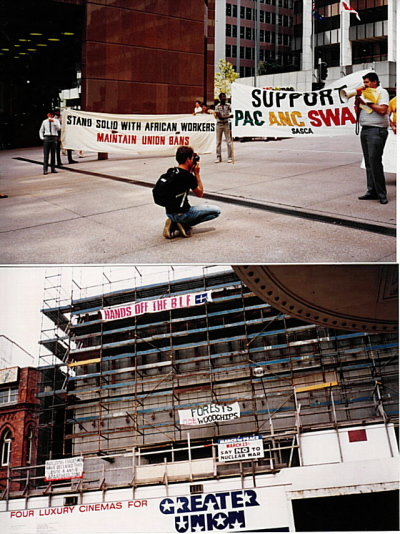
Photos of Union banners in Sydney in 1985 and 1986 - photos by Mannie De Saxe

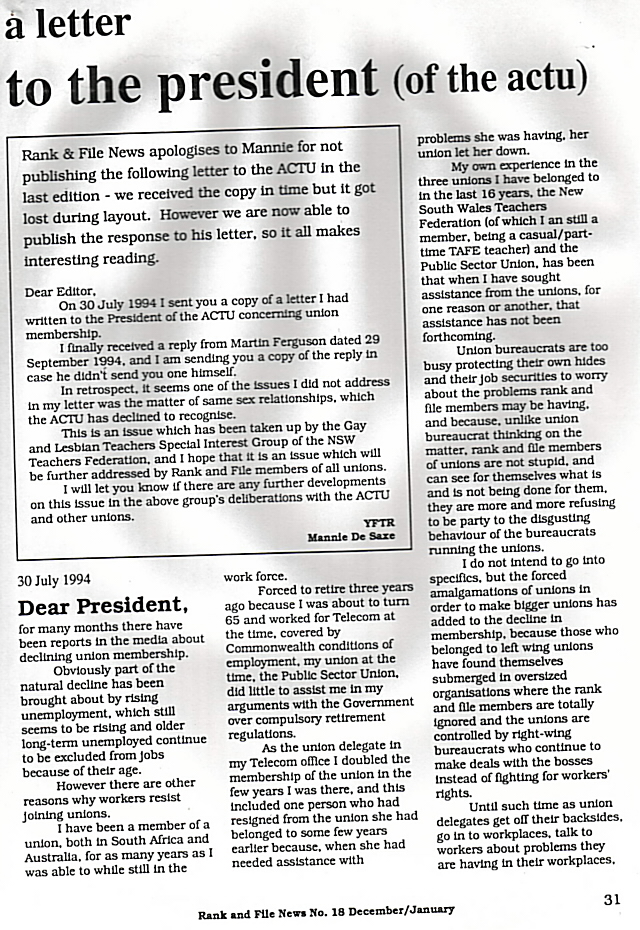
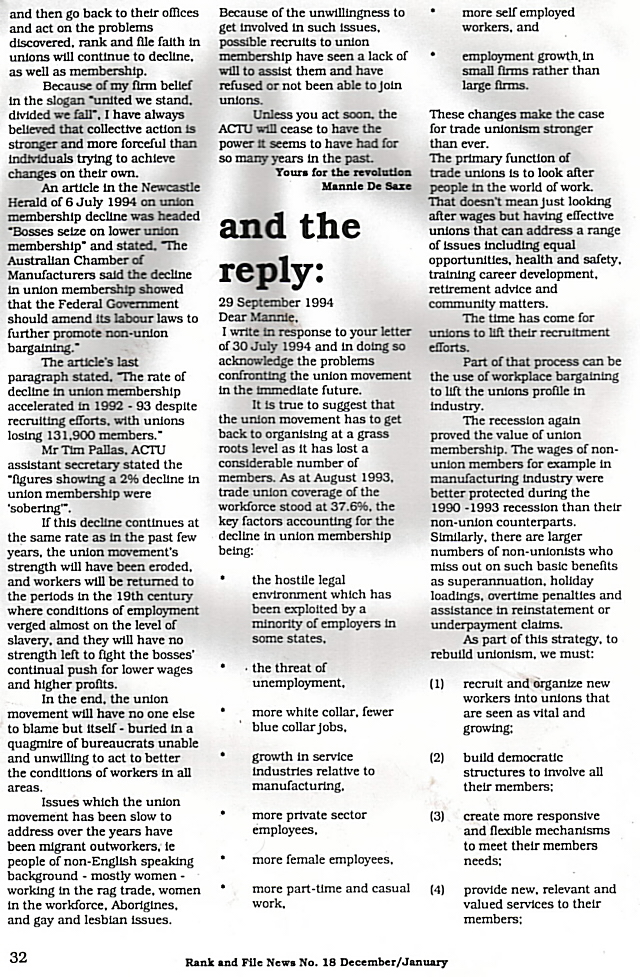
---------------------------------------------------------------------------------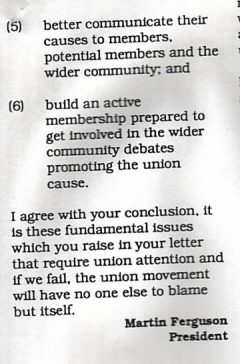




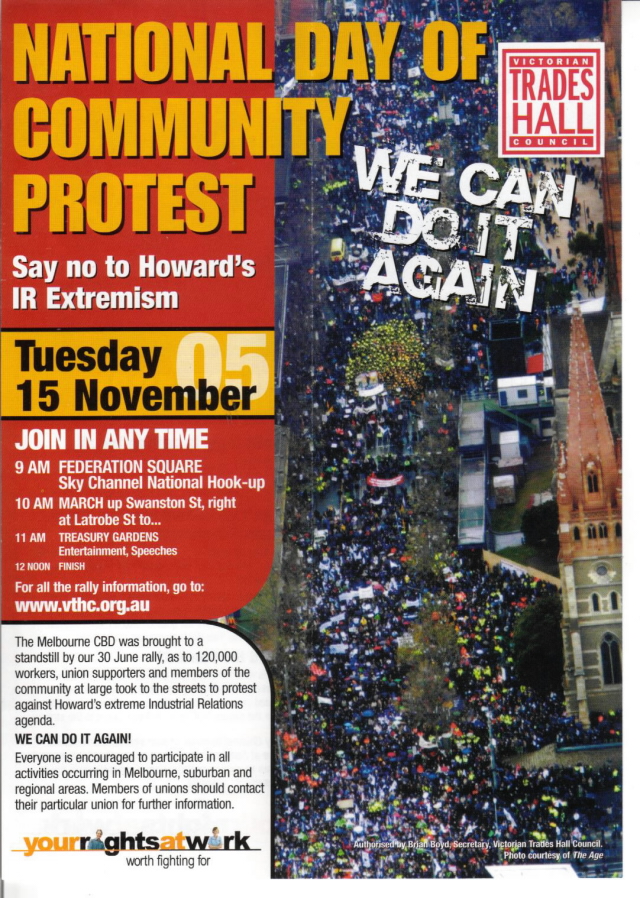

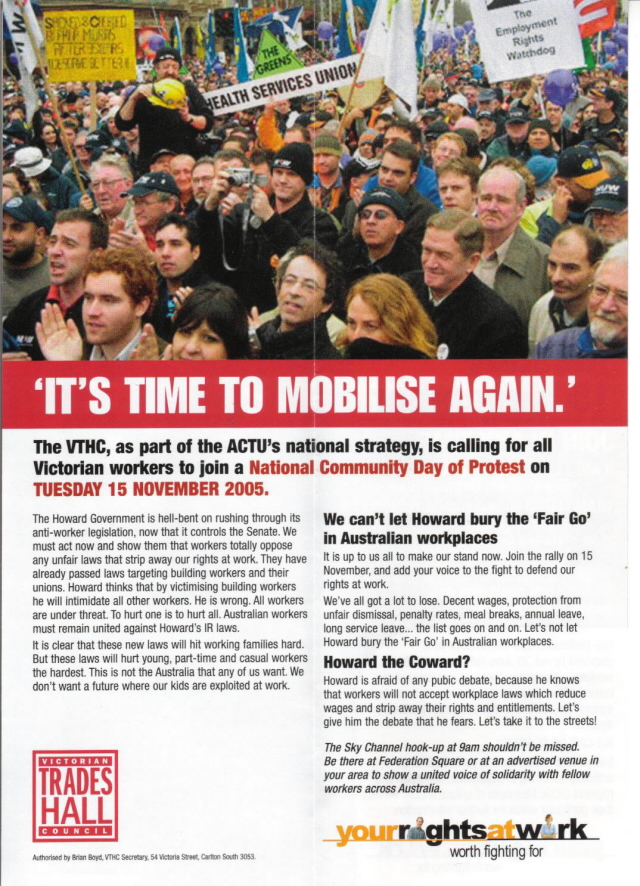

(This item was reported in LGS Newsletter No. 33, issue 3 / May-June 1997.)
In a blatant union busting exercise on 11th April 1997, three of the teaching staff of the Northern Melbourne Institute of TAFE were retrenched.
Alison Thorne, Ron Davis and Mark Wilson were from the VCE / Communication Studies Department. Despite the fact that there is work for them, all three were targeted by management for retrenchment because of their active unionism even though they are three of the best teachers in the department.
Alison has long been active in lesbian and gay politics. She has had to fight for her right to face-to-face classroom teaching in the past because of her outspoken activism.
The TAFE Sub-Branch of the Australian Education Union has mounted a campaign for reinstatement of the three TAFE teachers. As a unionist, it would be useful to get your union to support the campaign.
As an individual, a letter of protest at the retrenchment of the three to the Victorian Minister for Tertiary Education and Training, Level 21. Rialto Towers, 525 Collins Street, Melbourne, Vic.3000, would be appreciated. A copy to Lesbian & Gay Solidarity would also be appreciated.
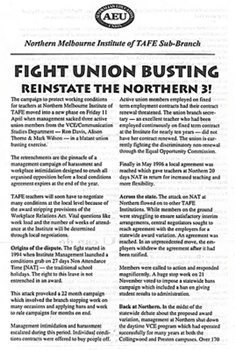
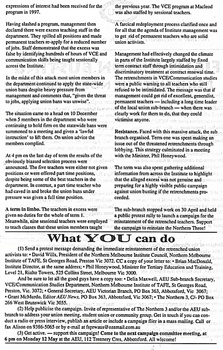
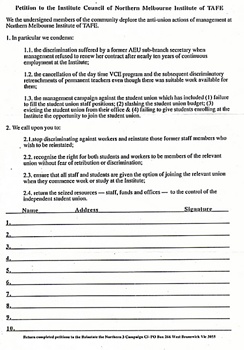
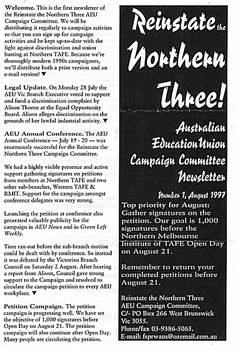
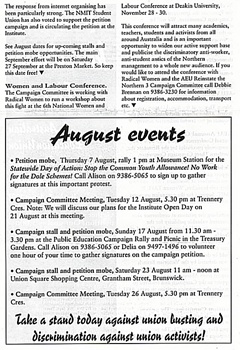
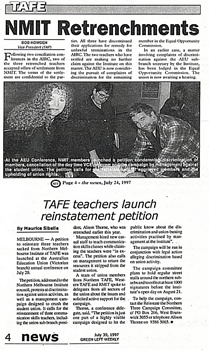
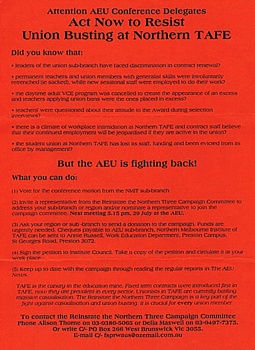

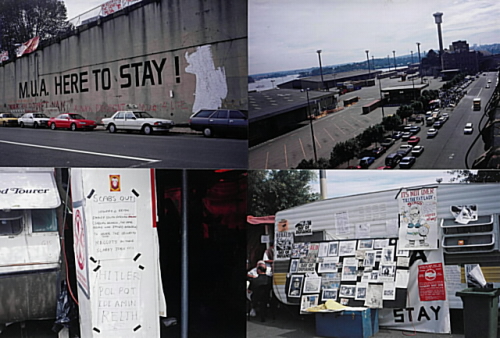
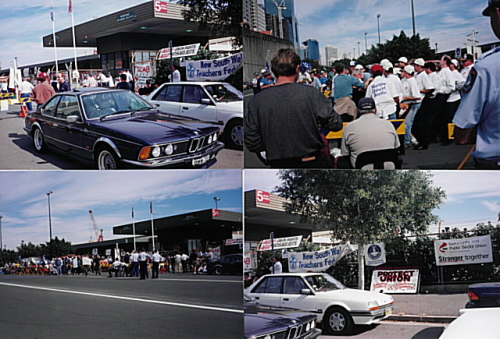
From 1996, when the Howard government got elected, Howard set in motion attempts to break the Australian trade union movement. Peter Reith was one of his ministers who relished the fights with such organisations, and he set out with a will to break the Maritime Union of Australia once and for all. Howard felt that it was time for total reform of the docks, and this was the most powerful of the unions controlling the waterfronts at this time. The battle that ensued in Sydney, Melbourne and other ports around the country ended with Reith appointing security guards with dogs and sending workers for training to Dubai and other doubtful places in order to return and scab their way into the docks. It all backfired with graphic pictures seen on television news bulletins, and many people in the country were shocked and horrified at what their government was doing.
In the end there were wins on both sides and losses on both sides as well, and what remained were unions which were much reduced in membership because so many of the jobs became mechanised and the numbers of workers were considerably reduced.

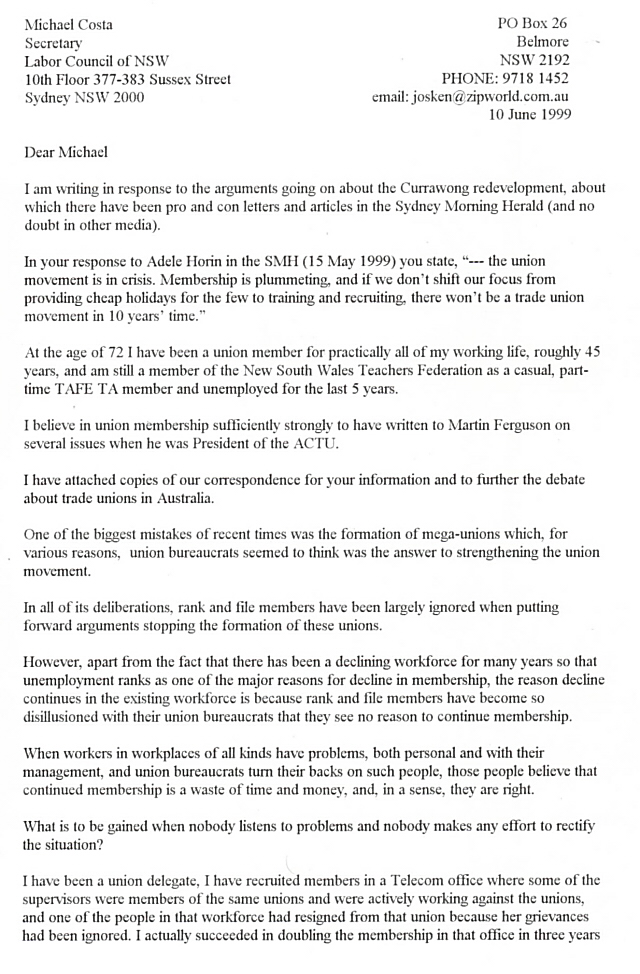
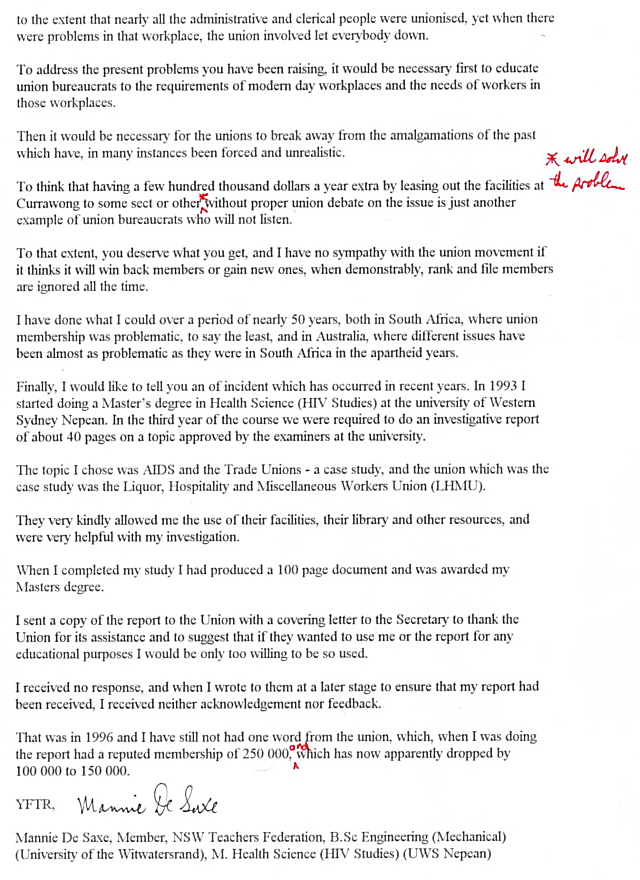
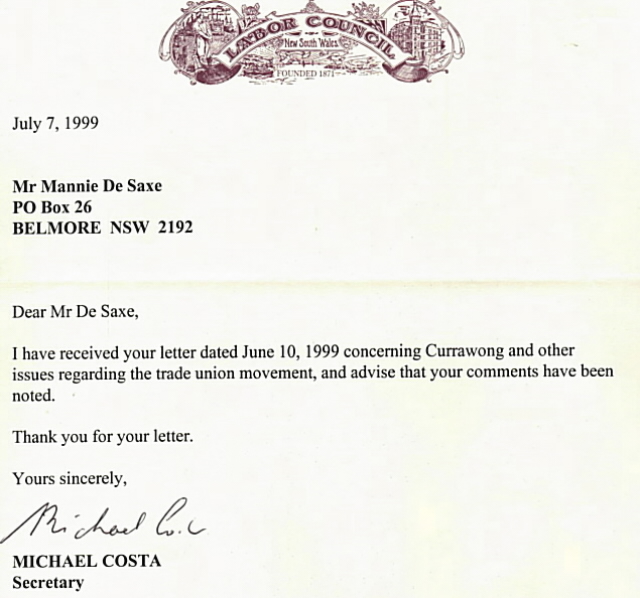


The Book Launch took place at the Victorian Trades Hall attended by about 300 people.
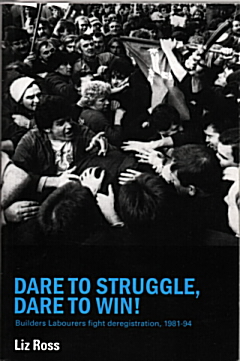
Builders Labourers fight deregistration, 1981-94
Liz Ross’s book is available now.
Buy the book!
"Dare to Struggle, Dare to Win!" If one phrase can sum up the militant Builders Labourers Federation it was this. Because they believed this, and backed it with action on the job - the courts and governments of the 1980s declared the BLF had to go. Conservative governments took the first steps, but it was Labor – backed by leading members of the ACTU and union movement - which finished the job. Subject to a Royal Commission, accusations of corruption against union secretary Norm Gallagher, trials, Arbitration Commission hearings and coordinated federal and state legislation the BLF was under siege for years. Then in 1986 the full force of governments and their police fell on the union when it was formally deregistered.
But this is not a story of defeat and despair. It is a story of resistance, much of it told in the words of the most important actors in this drama - rank and file workers. Builders Labourers and their supporters in other unions and the community waged a long struggle for union rights and militancy that has important lessons for today.
While highlighting the rank and file struggle, Liz Ross pulls together all the threads in this complex story and provides a left-wing analysis of the role of the employers, ALP and union leaders, and the historic ALP-ACTU Accord.
Here is the full story for the first time. The book is meticulously researched, with extensive use of archives, original union material and fify-seven interviews with participants.
Liz Ross is a long-standing left wing activist in Melbourne. She was a union delegate in the Department of Social Security for ten years during the Hawke years.
She has been a campaigner for women’s and gay liberation from 1972, a member of socialist organisations from the late 1970s, and active in solidarity with union struggles. Her history of the 1986 Victorian Nurses’ strike is included in the book Rebel Women in Australian Working Class History.
Liz is a member of Socialist Alternative.
For more information, e-mail us: red_sites@lycos.com

The following email was sent to two Australian unions following a call by unions in the UK to institute academic boycotts against Israeli educational institutions. Obviously the pro-zionist unions didn't even deign to respond!
Mannie De Saxe, PO Box 1675, Preston South Vic 3072,I refer you to the article below and request information from your unions as to whether you will support the boycott by Britains' largest union of lecturers of Israeli academics and higher education institutions that do not publicly dissociate themselves from Israel's "apartheid policies." As someone who strongly supports the boycott (as an ex-South African I am very well aware of issues such as the sanctions against South Africa which helped to bring down the apartheid regime) I would urge your organisations to do the same.
The world has been too slow to condemn the actions of Israel in the Occupied Territories, because of zionist propaganda by the Israel lobbies - particularly in the United States and Australia. I trust your organisations will consider the issue with great urgency - the sufferings in the West Bank and Gaza have gone on for too long already.
Benjamin Joffe-Walt, London May 31, 2006
BRITAIN'S largest union of lecturers has voted in favour of a boycott of Israeli academics and higher education institutions that do not publicly dissociate themselves from Israel's "apartheid policies".
They narrowly backed the proposal, despite mounting international pressure from those opposed to a boycott, including a petition from more than 5000 academics and a plea from the Israeli Government.
The decision was made at the annual conference of the National Association of Teachers in Further and Higher Education. It was greeted with disappointment and anger by anti-boycott campaigners last night, but Palestinian groups issued declarations of support.
Presented on the final day of the Blackpool conference, the motion criticised "Israeli apartheid policies, including construction of the exclusion wall and discriminatory educational practices". It invited members to "consider the appropriateness of a boycott of those that do not publicly dissociate themselves from such policies".
After failed efforts to prevent the debate, speakers outlined the litany of difficulties experienced by Palestinian students and lecturers living under occupation, including the number of schools shelled by the Israeli army.
"The majority of Israeli academics are either complicit or acquiescent in their government's policies in the occupied territories," said Tom Hickey, a philosophy lecturer from the University of Brighton and the proposer of the motion. "Turning a blind eye to what an Israeli colleague thinks about the actions of their government is a culpable blindness."
Delegate John Morgan, who seconded the motion, said there was no academic freedom for Palestinians. But the union's general secretary, Paul Mackney, spoke against the motion. "Most of us are very angry about the occupation of Palestine, but this isn't the motion and this isn't the way," he said.
"Any motion to boycott requires the highest level of legitimacy. As far as I can see, no more than a couple of (union) branches have discussed this motion. You cannot build a boycott on conference rhetoric."
Delegate Ronnie Fraser, chairman of Academic Friends of Israel, the primary opponents of the motion on the conference floor, said he was "not happy at all", adding that the vote brought "dishonour and sheer ridicule" on the union.
Last year Britain's Association of University Teachers elected to impose an academic boycott on two Israeli universities. After an international outcry and a revolt by members it reversed the decision.
The boycott resolution will have an official shelf life of less than three days, as the two unions will merge tomorrow, forming the world's largest higher education union with more than 110,000 members. The resolution will be advisory to the new union but proponents say the decision represents a step change in the wider boycott campaign against Israel.
Aharon Ben-Ze'ev, of Haifa University in Israel, was "very disappointed". "I never say to British colleagues, 'If you don't subscribe to my beliefs, I will boycott you,"' he said. Stephen Rose, of the British Committee for the Universities of Palestine, was delighted, saying: "We recognise that this has not been an easy decision."
He said the vote was "a historic step forward" in "helping persuade our Israeli academic colleagues that it is time to cease silent complicity with the illegal acts of the Israeli state". But he warned that this was likely to be the start rather than the end of the debate.

I sent the following email to two Australian Education unions, the National Tertiary Education Union and the Australian Education Union, on 2 June 2006. A month later, after receiving no response, I re-sent the email. To date there has been no feedback, so it is time to put the issue into the public domain for all to see how Australia's education unions are too afraid of the zionist lobby in this country to take any action to assert the right of the Palestinians to achieve their own country, with the occupying oppressors removing themselves from West Bank occupation.
Mannie De Saxe,
PO Box 1675, Preston South Vic 3072,
Phone: (03)9471 4878
email: josken_at_zipworld_com_au
Member - New South Wales Teachers Federation.
I refer you to the article below (item ABOVE, dated 31 May 2006 - concerning boycott by Britain's largest Education Union) and request information from your unions as to whether you will support the boycott by Britains' largest union of lecturers of Israeli academics and higher education institutions that do not publicly dissociate themselves from Israel's "apartheid policies." As someone who strongly supports the boycott (as an ex-South African I am very well aware of issues such as the sanctions against South Africa which helped to bring down the apartheid regime) I would urge your organisations to do the same.
The world has been too slow to condemn the actions of Israel in the Occupied Territories, because of zionist propaganda by the Israel lobbies - particularly in the United States and Australia. I trust your organisations will consider the issue with great urgency - the sufferings in the West Bank and Gaza have gone on for too long already.
Regards,
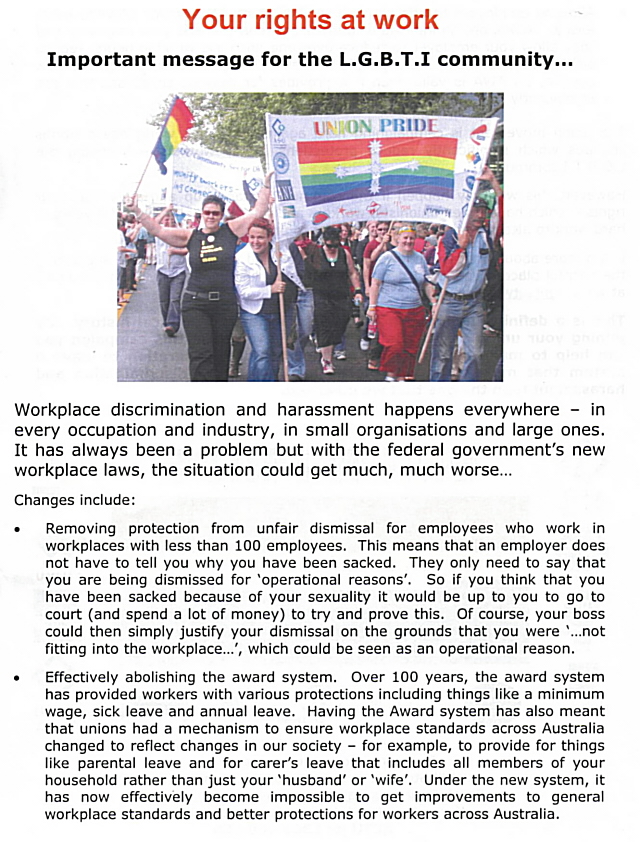
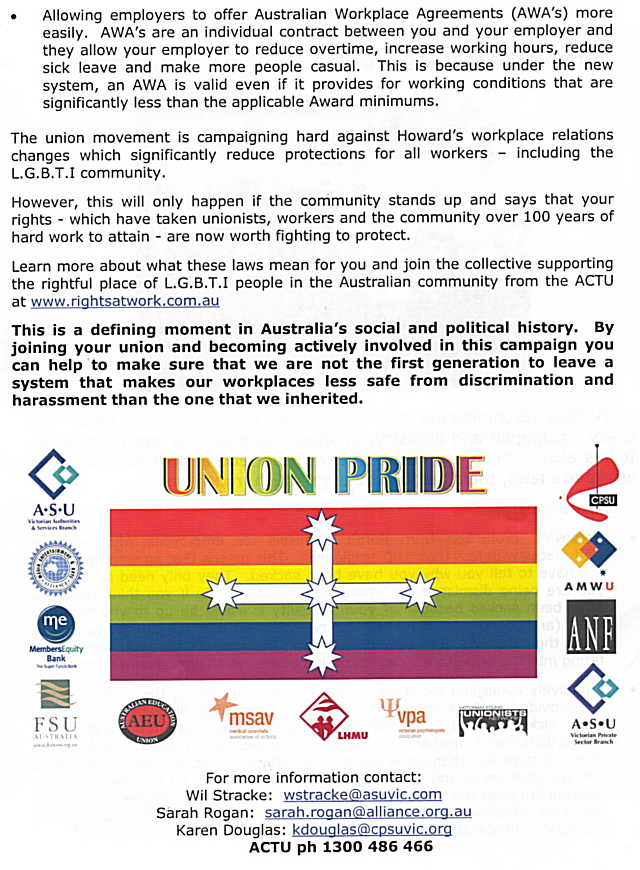

TRADE UNION MEMBERSHIP (From the Australian Bureau of Statistics web site)
In August 2005, there were 1,911,900 employees who were trade union members in conjunction with their main job, a 4% increase on the 1,842,100 trade union members recorded in August 2004. While the number of employees who were trade union members increased, the proportion of employees who were trade union members remained relatively stable between August 2004 (22.7%) and August 2005 (22.4%). The proportion of trade union memberships has decreased from 33% in August 1995, a fall of one third over the past decade.
The proportion of full-time employees who were trade union members was higher than for part-time employees (25% and 17% respectively). A higher proportion of public sector employees were trade union members (47%) than private sector employees (17%).
The above Australian Bureau of Statistics information last updated 8 December 2006

This report in The Age of 10 February 2007 is about crime in South Africa and the response of a trade union organisation:
South African trade union Solidarity is so fed up with crime it has ordered the delivery of 25 wheelbarrows piled with at least 25,000 letters of complaint to President Mbeki.
Solidarity ordered the wheelbarrows before Mr Mbeki’s state of the nation speech yesterday (9 February 2007), “after the office of the President denied it had received any letters and even expressed doubt over the existence of the letters”.
In his nationally televised speech, Mr Mbeki promised to step up the fight against crime, improve AIDS programs and ease poverty. He said he would boost the police force to more than 180,000 within three years.

(submitted by Michael Schembri)
Labor will be hoping for a free kick in its pre-election ‘war on Work Choices’ campaign, with the release later this month of findings from a new ILO report.
Speaking at the Australian Labour Law Assoc conference yesterday (March 7), shadow foreign affairs minister Robert McClelland said the report by the Committee of Experts on the Application of Conventions and Recommendations would be “instructive on how far the Howard Govt has strayed from its international [labour] obligations”.
McClelland said Australia had been repeatedly criticised by the ILO since 1997 for its failure to comply with 87 convention requirements governing freedom of association and protection of the right to organise. He said he believed the latest report would take that criticism a step further, highlighting a raft of post-Work Choices breaches by the Howard Govt including preferential treatment for AWAs over union collective agreements, removal of strike protection, allowing employers to unilaterally set terms under greenfields agreements, expanding prohibited items in agreements, removing rights to claim unfair dismissal, and limiting union rights of entry.
“In 1996, the OECD declared that countries should not engage in international trade without some adherence to minimum labour law standards including freedom of association and the effective recognition of the right to collective bargaining,” McClelland said. “In removing established industrial protections for Australian workers, the govt has clearly ignored broader community concerns about the effects of globalisation on their job security and working lives.”
Source: Workforce Daily

By Alan Cowell (in the International Herald Tribune and New York Times)
Monday, April 16, 2007
LONDON: Britain's biggest journalists' union, The National Union of Journalists, has criticized Israel's "military adventures" and has voted narrowly in favor of a boycott of Israeli goods. The vote followed calls by some British academics last year to ostracize their Israeli counterparts.
At the annual delegates meeting of the journalists' union last Friday, a vote calling for "a boycott of Israeli goods similar to those boycotts in the struggles against apartheid in South Africa" was approved 66 to 54.
The delegates also urged Britain and the United Nations to impose sanctions on Israel.
The union has about 40,000 members, represented at the annual meeting by about 150 delegates from more than 60 branches.
The ballot did not, however, make calls for a boycott of contacts with Israeli journalists similar to previous academic efforts to ostracize Israeli university teachers.
The call for a boycott was initially part of a broader condemnation of what the union called Israel's "slaughter of civilians" in Gaza and "savage pre-planned attack" last year on Lebanon, but the boycott was voted on separately. The condemnation of Israeli military action in Gaza and Lebanon was approved by a wider margin.
In the debate leading to the vote, some delegates argued that a call for a boycott would not help British journalists do their job in Israel. Others argued that it was not the job of a journalists' union to get so involved in such issues.
The timing of the ballot was particularly delicate because a BBC journalist, Alan Johnston, has been held for more than a month in Gaza, making the boycott call seem one-sided. A Palestinian group claimed Sunday to have killed Johnston but the BBC said it was treating the report as a rumor.
"We had a whole separate section of the conference" devoted to Johnston's plight, said Jeremy Dear, the union's general secretary.
According to the union's Web site, www.nuj.org.uk, the delegates voted unanimously to "keep up the urgent global campaign for Alan's release" and criticized the Palestinian authorities for failing "to carry out their promises to do all they can to free Alan."
Dear said there had been "some feedback," primarily from unidentified e-mail correspondents in the United States, saying Johnston "should be put in a concentration camp" or tried for hate crimes.
He said those who supported a boycott had argued that while the union represented journalists, it still had a duty to uphold things "that are in our constitution" concerning human rights.
On the union's conference blog, however, a critic of the vote, identified as Olivia Lang, said, "It is not going to make life easier for journalists anywhere in the world" to be seen to be taking sides. "We need to strive to maintain our objectivity when reporting," she wrote.
The vote stirred little immediate comment in Britain, however. Jonathan Freedland, a columnist for The Guardian and The Evening Standard, who said he is a member of the National Union of Journalists, took issue in a telephone interview with the union's decision, saying it made no distinction between Israel itself and Israeli settlements in occupied territories. "This punishes Israel proper along with settlers as if the two were the same," he said.
Moreover, he said, "as a tactic, it strikes a raw nerve in the Jewish psyche.""You won't win over the Jewish diaspora" with such boycott calls, he said. Last year, the largest British association of university teachers voted to encourage individual academics in Britain to sever professional contact with their counterparts in Israel. That vote echoed an appeal one year earlier by a smaller association, which first demanded a boycott of two Israeli universities and then withdrew the call under pressure from some of its members. The two associations later merged and the policy lapsed, said Trevor Phillips, a spokesman for the combined association. It will be discussed again next month, he said.
Antony Loewenstein comments:
"Predictably, the Anti-Defamation League (ADL) has reacted with typical fury, but they shouldn’t be surprised. The union will be accused of anti-Semitism, lacking objectivity, bias, anti-Zionism and Jew-hatred. The reality, of course, is far different.
Israel’s consistent refusal, like apartheid South Africa, to cease oppressing the indigenous communities, has forced the hand of a growing number of major Western groups. They are dedicated to a just Israel, and only international pressure may ensure this will happen."

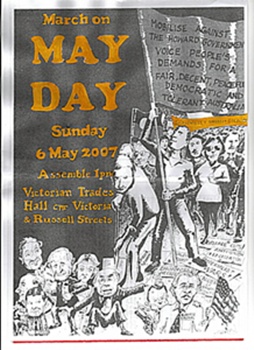

This picture was on the front page of The Age Green Guide on 10 May 2007 which gave details of the Bastard Boys drama documentary presented in two parts on ABC television on 12 and 13 May 2007. This was one of the defining moments in the dispute when the picture was shown in the media around Australia, together with dogs also used by Patricks during the dispute.
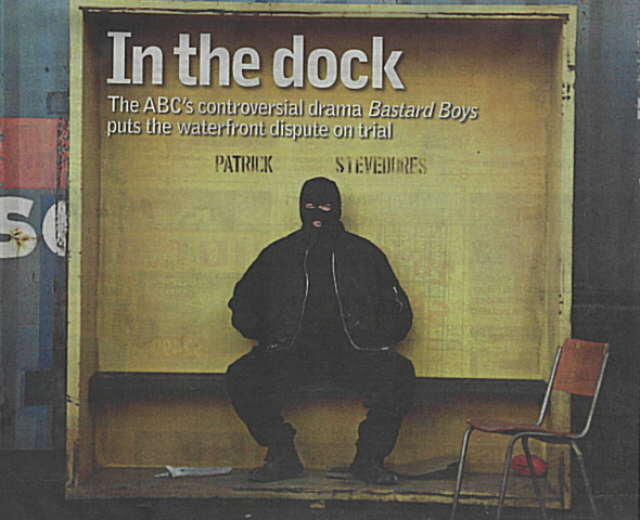
A great deal of controversy has arisen since the showing of the drama. Compaints that it was sympathetic to Corrigan and showed the waterside workers as always drinking and swearing and that it was unrealistic in relation to what really happened are part of the discussion.
The dramatisation of the main players, it has been argued, veered from the truth too much and made caricatures of many of the players.

Photo not available of UCU delegates voting Wednesday in Bournemouth to support a call by Palestinian trade unions for a boycott on Israeli academe. (Brandon Kelly)
By Haaretz Staff
Cabinet minister Yitzhak Herzog, responsible for the government's handling of issues related to anti-Semitism, denounced Thursday as "scandalous, discriminatory and one-sided" a decision by a British lecturers' union to promote a boycott of Israeli academic institutions, in protest at Israel's policy on the Palestinians.
The vote was passed by 158 votes to 99 at the University and College Union (UCU) conference in Bournemouth on Wednesday.
Herzog has spoken with British Ambassdor to Israel Tom Phillips to convey Israel's condemnation of the move.
It is especially troubling, Herzog told Israel Radio, that "the decision was taken in a nation which is considered friendly to Israel."
The decision "necessates soul-searching on that part of all citizens of Britain," he said.
The motion passed Wednesday says that the UCU will present the question of a boycott on Israel's academics for discussion by all its members. According to the motion, congress much send "the full text of the Palestinian boycott call to all branches for information and discussion."
Among the amendments added to the proposal and approved by the union was a clause pledging the group to campaign for "a moratorium on research and cultural collaborations with Israel via EU and European Science Foundation funding until Israel abides by UN resolutions."
The discussions are scheduled to take place over the next 12 months. The motion encouraged union members to "consider the moral implications of conducting ties with Israeli academic institutions."
The vote was preceded by a heated discussion in which Israel was repeatedly referred to as an apartheid state, engaging in crimes against humanity in the Palestinian territories. The union representatives said the situation in the West Bank and Gaza Strip did not allow spectators to stand idly by.
As part of the motion, the congress will disseminate Palestinian trade unions' request for a boycott against Israel in all the union's offices.
The congress also said it would arrange for academics from the Palestinian Authority to attend delegations to the U.K. The union's representatives also decided to establish direct contact with Palestinian workers' organizations.
Ronnie Fraser, who heads the British group "Academic Friends of Israel," said that "the vote proved that nothing has changed within the ranks of the U.K.'s academic unions. This is another boycott."
In 2005, Fraser acted to overturn another boycott against Israel, which had been approved by the Association of University Teachers (AUT.) That decision was overturned a month after it was passed. In 2006, the National Association of Teachers in Further and Higher Education (NATFHE) also moved to boycott Israel, but its decision became invalid shortly thereafter when NATFHE and AUT merged to form the UCU.
After the vote, the head of the UCU, Sally Hunt, reiterated her opposition to the motion.
'As I have made clear in the past, and as I reiterated on the floor of congress this morning, I do not believe a boycott is supported by the majority of UCU members, nor do I believe that members see it is a priority for the union," she said in a statement on the UCU Web site.
She said, however, that the 120,000 members of the union would now have a chance to express their opinions on a boycott, a move that she said she supported.
"Today's motion... means all branches now have a responsibility to consulate all of their members on the issue and I believe that every member should have the opportunity to have their say. The earlier motion means that any future calls for a boycott must pass key tests before a boycott can implemented."
Israeli Ambassador to the United Kingdon Zvi Hefetz called the resolution offensive to the British Jewish community, saying that, "Its slanted phrasing reeks of ignorance."
Adrian Fronda, a senior mathematics lecturer who had joined the union solely to vote against the boycott, was less diplomatic. "I came here to oppose the prevalent anti-Semitism we see all around us here," he said.
Education Minister Yuli Tamir condemned the union's decision, saying she would address British Education Secretary Alan Johnson on the matter.

By Cnaan Liphshiz, Haaretz Correspondent
South Africa's largest trade union federation will launch a campaign against "the Israeli occupation of Arab lands" this week, demanding that Pretoria impose a boycott on all Israeli goods and break diplomatic relations. South African Intelligence Minister Ronnie Kasrils, who is Jewish, told Haaretz that he actively supported the initiative - which contradicts the policy of his own cabinet.
The president of the Congress of South African Trade Unions (Cosatu), Willy Madisha, announced the launching of the campaign last week in Johannesburg, calling on the government to cease all diplomatic relations with Israel after its attacks on Palestinian leaders.
"The best way to have Israel comply with United Nations resolutions is to pressure it by a diplomatic boycott such as the one imposed on apartheid South Africa," Madisha said. Cosatu belongs to a recently-formed coalition of organizations operating under the banner "End The Occupation."
Kasrils' anti-Israeli organization Not In My Name belongs to the coalition working toward an embargo on Israel. This runs contrary to South Africa's official stance, and to President Thabo Mbeki's decision to strengthen trade ties with Israel. Mbeki, who heads the ANC ruling party, even appeared as a guest at Israel's Independence Day celebrations in Durban last month.
Kasrils, a member of the ANC, told Haaretz that his support for severing all ties with Israel was not in opposition to his cabinet's policy. "Cosatu is an ANC ally in the coalition against the Israeli occupation. Most elements of this coalition call for boycotting Israel, although the ANC does not," he said.
"We respect their right to encourage people to boycott Israeli goods. As a South African consumer I personally will not purchase Israeli goods until Israel changes its present policy regarding the Palestinians."
Cosatu's spokesman, Patrick Craven, said Kasrils was involved in directing the campaign for imposing a political and economic embargo on Israel. "This is intended to include the diamond trade," he added.
Craven acknowledged that his organization's primary objectives did not pertain to the Middle East, noting that while Cosatu's main goal was improving the material conditions of its 1.8 million members, "it could not stand idly by as Israel perpetrated atrocities in Palestine." Adding that he anticipated "some short-term damage" to South Africa's economy following the boycott, Craven said the damage was "vastly outweighed by the importance of stopping injustice."
The campaign that Cosatu has helped mount will begin Friday, with sermons in South Africa's mosques on "the plight of the Palestinian people". The Christian organizations of the coalition will begin addressing the issue in churches Sunday.
The organizers intend to picket across South Africa next week, including a picket by members of parliament and a candlelight vigil outside the U.S. Consulate in Johannesburg. The ANC ruling party has called for a parliamentary debate on "Israeli occupation."
Campaign activists will also hold pickets outside selected stores selling Israeli goods. The events will culminate in mass marches and rallies on Saturday, June 9, both in Cape Town and Johannesburg.


The following Union Solidarity Leaflet was handed out at the "Walk Against Warming" Rally on 11 November 2007:
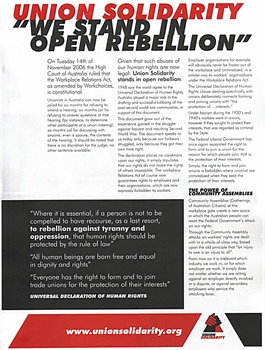
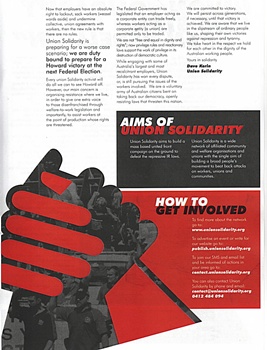



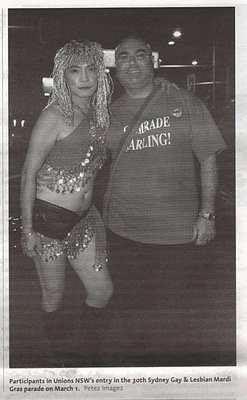
Danny and partner Michael (member of Lesbian and Gay Solidarity) take part in Mardi Gras 30 parade as part of Unions NSW's entry - photo by Petez Imagez in Education Journal of 10 March 2008

(Patrick Bond is the Director of the Centre for Civil Society at the University of KwaZulu-Natal)
Yesterday’s decision by dockworkers to boycott the handling of Israeli imports is of enormous importance, and will prod more Durban citizens – including academics and cultural activists - to also raise concerns about institutional linkages that give the Israeli state legitimacy.
On Sunday, the SA Transport and Allied Workers Union aim to repeat last year’s feat of turning back a huge ship symbolizing and contributing to oppression. A protest with Congress of SA Trade Unions president Sdumo Dlamini will be held at the mouth of the port that day at 10am.
Recall last April that the contents of the Chinese ship “An Yue Jiang” were destined for Robert Mugabe’s army, including three million bullets and sophisticated weaponry. The ship was repelled from a series of southern African ports by dockworkers once local Anglican Bishop Rubin Philip raised the alarm.
The ship scheduled to arrive Sunday, the “Johanna Russ” (flying an Antigua flag), is owned by M.Dizengoff and Co., an established “pioneer of the modern era of shipping business in the Middle East” and shipping agent for the ironically named Zim Israel Navigation Company. It probably does not have bullets in the hold, but does bring revenues to the Israeli economy.
The anti-apartheid movement’s success was due in part to economic pain inflicted on the racist state and English-speaking businesses by sanctions, leading to a partial break in August 1985 immediately following PW Botha’s “Rubicon” speech here in Durban. That split in turn led to a nine-year process of power transfer and democratization.
Can local civil society activists promote a similar non-violent democratization of Israel/Palestine, by breaking relations between Israel and Durban importers? The SA Zionist Federation’s Bev Goldman warned the Daily News last week, “A boycott would undermine relations between Israel and SA and result in a negative impact on the economy.”
An end to such relations is what the Cosatu demands, even if they themselves sacrifice some jobs in the process, on behalf of Gaza Palestinians suffering what are called by leading United Nations officials – and will probably also be known in The Hague International Criminal Court - as Israel’s crimes against humanity.
Cosatu and the Palestine Support Committee remind us of the long history in which injustice travels to docks: “In 1963, just four years after the Anti-Apartheid Movement was formed, Danish dock workers refused to offload a ship with South African goods. When the ship docked in Sweden, Swedish workers followed suit. Dock workers in Liverpool and, later, in the San Francisco Bay Area also refused to offload South African goods.”
Last week, Western Australian dockworkers announced a similar move against Israeli shipping.
And in spite of what is known as “The Israel Lobby” that influences Washington’s foreign policy, more than 300 US academics pledged an Israel boycott last month, restarting a movement that has traveled from Britain to Canada with mixed results.
On January 14, the Israel Lobby – especially the American Israel Political Action Committee (AIPAC) - was stupidly misnamed by SA’s deputy foreign affairs minister Fatima Hajaig as “Jews” (there are plenty of right-wing Christian zealots who also support Israel’s barbaric policies): “If Jewish money controls their country, you cannot expect anything else.”
Though she obviously should have used the adjective “Zionist” not “Jew”, Hajaig’s basic point is correct. Assuming she corrects the phraseology, she should not face discipline in the Human Rights Commission, especially if Hajaig can turn around SA foreign policy towards consistent solidarity with the oppressed, in view of Pretoria’s “talk left, walk right” tendency and abominable recent record of oppression-nurture in the UN Security Council.
After all, as the two leading experts on the Israel Lobby – the University of Chicago’s John Mearsheimer and Harvard’s Stephen Walt - pointed out in the London Review of Books, both Fortune magazine and the National Journal rated AIPAC in second place “in the Washington ‘muscle rankings’.”
How did AIPAC build its muscles? Just like Hajaig says: with money. According to Mearsheimer and Walt, “Its success is due to its ability to reward legislators and congressional candidates who support its agenda, and to punish those who challenge it. Money is critical to US elections (as the scandal over the lobbyist Jack Abramoff’s shady dealings reminds us), and AIPAC makes sure that its friends get strong financial support from the many pro-Israel political action committees. Anyone who is seen as hostile to Israel can be sure that AIPAC will direct campaign contributions to his or her political opponents.”
As Mearsheimer and Walt conclude, “The bottom line is that AIPAC, a de facto agent for a foreign government, has a stranglehold on Congress… The Lobby’s influence causes trouble on several fronts. It increases the terrorist danger that all states face – including America’s European allies. It has made it impossible to end the Israeli-Palestinian conflict.”
Campaigning against apartheid for many years, many of us in international civil society found sanctions and divestment a useful tool under these conditions, so as to reduce the monetary incentive for ongoing racism.
The parallel is real. Remarks Harvard law professor Duncan Kennedy on the past month’s carnage: “It is important to understand the 1,300 Palestinian casualties, including 400 children as well as many, many women, versus 13 Israeli casualties, as typical of a particular kind of ‘police action’ that Western colonial powers and Western ‘ethnocratic settler regimes’ like ours in the US, Canada, Australia, Serbia and particularly apartheid South Africa, have historically undertaken to convince resisting native populations that unless they stop resisting they will suffer unbearable death and deprivation.”
“What is to be done?”, asks Kennedy. “You might consider some small step, perhaps just a contribution to humanitarian relief for Gaza, or e-mailing the White House, or something more, like advocating for Harvard to divest.”
Fully aware of the role that progressive white SA academics played in the anti-apartheid struggle, including divestment/sanctions advocacy, we at the UKZN Centre for Civil Society are deep in debate on this matter.
Although CCS staff have conflicting views, four of our senior academics – myself and honorary professors Alan Fowler (former International Society for Third Sector Research president), Adam Habib (University of Johannesburg Deputy Vice Chancellor) and Dennis Brutus – issued a statement this week to confirm our own concern about the Ben Gurion University Israeli Centre for Third Sector Research.
Our attempts last week to suggest that an international conference they are holding in Israel next month introduce meaningful Palestinian inputs on the incursion into Gaza were unsuccessful, so we simply cannot endorse attendance.
On the cultural front there is a similar debate. Three weeks ago, Israeli ambassador Dov Segev-Steinberg visited the Catalina Theatre at Wilson’s Wharf, where protesters from the Action Group for Palestine protesters demanded that the Musho festival cease Israeli-sponsored events.
The lead here comes from the UKZN Centre for Creative Arts, which since 2001 has not accepted Israeli state cultural funding, according to the CCA’s Monica Rorvik.
It may be that some Israeli academic and cultural activities promote Palestinian liberation, and deserve exemption, although Brutus suggests a full boycott.
Regardless, the higher consciousness civil society activists seek by raising the ethics of SA-Israeli relationships can do some good. Just witness last week’s Mercury letter from well-known conservationist Ian Player in reference to the non-violent demonstration that Durban city manager Mike Sutcliffe squelched against last month’s Dusi canoe marathon: “I cannot imagine that a single canoeist would have taken umbrage at the Qadi people making a silent protest [against land dispossession] by standing on the banks.”
I read the letter to Qadi leader O’Brien Gcabashe on the phone and he replied, “We are going back to the next Dusi marathon at the Inanda Dam this Friday – fewer than 15 of us so as to not violate the Gatherings Act – and we expect the police to let us exercise our constitutional right to protest this time.”
Such a gesture - like boycotting Israeli economic, sporting, academic and cultural activities in solidarity with Palestinians – may, to borrow Player’s words, “highlight the critical importance of resolving their plight.”
(Patrick Bond directs the UKZN Centre for Civil Society.)Hi all,
This is one of the latest postings from Links - http://links.org.au/node/888 - with a statement (unsourced) from COSATU concerning the decisions of waterside workers in Durban to ban unloading an Israeli ship this Sunday, 8 February. That is exciting news!
It appears this action is in part inspired by the resolutions adopted by the WA MUA at a monthly meeting that has been reported on this list. You have just got to love international solidarity and the power of the internet!
These resolutions are to be debated at our MUA state conference in two weeks time. There will be hundreds of MUA delegates from around the state and nationally, national officials and delegations from other unions in Australia and internationally. A very big conference considering the WA MUA is only a fighting force of 3,000 in this state. This is a far more authoritative body than our monthly meetings.
We are excited about these developments in South Africa. Both COSATU and SATAWU are sending delegations to our conference and it will certainly strengthen our hand in launching a BDS campaign through the Australian union movement.
And, of course, we aren't frightened about belting the boss even in this current economic climate.
Comradely, JammoIn a historic development for South Africa, South African dock workers have announced their determination not to offload a ship from Israel that is scheduled to dock in Durban on Sunday, February 8, 2009. This follows the decision by COSATU to strengthen the campaign in South Africa for boycotts, divestment and sanctions against apartheid Israel.
The pledge by the South African Transport and Allied Workers Union (SATAWU) members in Durban reflects the commitment by South African workers to refuse to support oppression and exploitation across the globe.
Last year, Durban dock workers had refused to offload a shipment of arms that had arrived from China and was destined for Zimbabwe to prop up the Mugabe regime and to intensify the repression against the Zimbabwean people. Now, says SATAWU’s General Secretary Randall Howard, the union’s members are committing themselves to not handling Israeli goods.
SATAWU’s action on Sunday will be part of a proud history of worker resistance against apartheid. In 1963, just four years after the Anti-Apartheid Movement was formed, Danish dock workers refused to offload a ship with South African goods. When the ship docked in Sweden, Swedish workers followed suit. Dock workers in Liverpool and, later, in the San Francisco Bay Area also refused to offload South African goods. South Africans, and the South African working class in particular, will remain forever grateful to those workers who determinedly opposed apartheid and decided that they would support the anti-apartheid struggle with their actions.
Last week, Western Australian members of the Maritime Union of Australia resolved to support the campaign for boycotts, divestment and sanctions against Israel, and have called for a boycott of all Israeli vessels and all vessels bearing goods arriving from or going to Israel.
This is the legacy and the tradition that South African dock workers have inherited, and it is a legacy they are determined to honour, by ensuring that South African ports of entry will not be used as transit points for goods bound for or emanating from certain dictatorial and oppressive states such as Zimbabwe, Swaziland and Israel.
COSATU, the Palestine Solidarity Committee, the Young Communist League and a range of other organisations salute the principled position taken by these workers. We also take this opportunity to salute the millions of workers all over the world who have openly condemned and taken decisive steps to isolate apartheid Israel, a step that should send shockwaves to its arrogant patrons in the United States who foot the bill for Israel’s killing machine. We call on other workers and unions to follow suit and to do all that is necessary to ensure that they boycott all goods to and from Israel until Palestine is free.
We also welcome statements by various South African Jews of conscience who have dissociated themselves from the genocide in Gaza. We call on all South Africans to ensure that none of our family members are allowed to join the Israeli Occupation Forces’ killing machine.
In celebration of the actions of SATAWU members with regard to the ship from Israel, and in pursuance of the campaign for boycotts, divestment and sanctions against Israel, and our call on the South African government to sever diplomatic and trade relations with Israel, this coalition of organisations has declared a week of action beginning on Friday, February 6, 2009. The actions will be organised under the theme: FREE PALESTINE! ISOLATE APARTHEID ISRAEL! Activities that have already been confirmed for this week will include:
• Friday, February 6: A protest outside the offices of the South African Zionist Federation and the South African Jewish Board of Deputies, 2 Elray Street, Raedene, off Louis Botha Avenue. Both these organisations unquestioningly supported the recent Israeli attacks against Gaza, and supported the massacre of civilians and the attacks on schools, mosques, ambulances and UN refugee centres. Protesters will be addressed by, among others, SATAWU General Secretary Randall Howard, and ex-minister Ronnie Kasrils. Protest starts at 14:00.The Palestinian Boycott, Divestment and Sanctions National Committee (BNC) warmly salutes the South African Transport and Allied Workers Union (SATAWU), a member of COSATU, for its decision today not to offload an Israeli ship that is due to arrive in Durban, South Africa, on 8 February. Coming weeks after the massive Israeli massacre in Gaza, this distinguished expression by SATAWU of effective solidarity with the Palestinian people in general, and with Gaza in particular, sets a historic precedent that reminds us of the first such action during the apartheid era taken by Danish dock workers in 1963, when they decided not to offload ships carrying South African products, triggering a similar boycott in Sweden, England and elsewhere.
Last week, endorsing the Palestinian Call for Boycott, Divestment and Sanctions (BDS), the Maritime Union of Australia (Western Australia) resolved to boycott all Israeli vessels and all vessels bearing goods arriving from or going to Israel. A few weeks before, Greek dock workers threatened to block a ship carrying weapons to Israel during its criminal war on Gaza. Those actions, together with the SATAWU decision today, will most likely usher in a new, qualitatively advanced phase of BDS that goes well beyond symbolism. We call on dock workers' unions around the world to endorse similar sanctions against Israeli or Israel-bound cargo.
Support in South Africa for the Palestinian struggle against Israel's colonial and apartheid policies and its war crimes is reaching new heights, with COSATU, the South African Council of Churches, the Palestine Solidarity Committee, the Young Communist League and many grassroots organisations and networks leading diverse forms of BDS campaigns, informed by the long and ultimately successful struggle of South Africans against apartheid. The Palestinian and global BDS movement against Israel is indebted to the people of South Africa for their inspiring and morale-boosting solidarity.
If Gaza today has become the test of our universal morality and our common humanity, the fast spreading BDS movement around the world has passed the test with flying colors. In fact, worldwide support for BDS against Israel in reaction to its war crimes and crimes against humanity in the occupied Gaza Strip and the West Bank, including Jerusalem, has shown that international civil society fully recognises that Israel must be held accountable before international law and must pay a heavy price for its atrocities and ongoing willful destruction of Palestinian society.
In this context, the decision by each of Venezuela, Bolivia, Qatar and Mauritania to sever diplomatic ties with Israel was a particularly commendable way of challenging Israel's impunity. The shift from traditional, mostly symbolic, solidarity to BDS in Norway, Sweden, Britain, Ireland, Turkey, Canada, Belgium, Malaysia, Spain, USA, Brazil, New Zealand, among others, is a resounding endorsement of effective, morally and politically sound action to end Israel's multi-faceted oppression of the indigenous people of Palestine and to bring about a just peace to Palestine and the entire region.
The Palestinian civil society Call for Boycott, Divestment and Sanctions (BDS) against Israel, launched in 2005 by over 170 Palestinian political parties, unions and organisations, offers the vehicle for all people of conscience, organisations and institutions around the globe to join the collective effort to reaffirm the primacy of international law, human rights and dignity. To replicate the strength and effectiveness of the anti-apartheid movement of the 1980s, the BNC urges civil society institutions and every concerned citizen around the world to:
• Integrate BDS in every struggle for justice and human rights, by adopting wide, context-sensitive and sustainable boycotts of Israeli products, companies, academic and cultural institutions, and sports groups, similar to the actions taken against apartheid South Africa;
The following article is from the web pages of "War on Want":
Secretariat of the Palestinian Boycott, Divestment and Sanctions National Committee (BNC).The boycott, divestment and sanctions (BDS) campaign against Israel continues to gather momentum after receiving a historic vote of support from the British trade union movement. On Thursday 17 September, in a landmark move, the British Trade Union movement voted to support Palestinian civil society’s BDS call. A motion was passed at the annual Trade Union Congress by unions representing 6.5 million workers in the UK support BDS tactics against Israel until it complies with international law.
Yasmin Khan, senior campaigns officer at War on Want, said: "Over the last 60 years Israel has continuously acted in defiance of UN resolutions, international law and global outrage. Yet the international community has failed to act to stop Israel's crimes against the Palestinian people. Instead the British government amongst others has rewarded Israeli aggression with financial, military and diplomatic support.
"The trade union movement has taken a courageous decision today to stand up against this injustice, just like it stood up to racist South Africa in the anti-apartheid movement.
"This is a wake up call to Downing Street that there can be no more business as usual with Israel. A ban on trade with illegal settlements and a two-way arms embargo with Israel must be implemented immediately."
Boycott, divestment and sanctions were widely used in the anti-apartheid movement. Palestinian civil society in 2005 launched its call for boycott, divestment and sanctions against Israel, with the initial endorsement of over 170 Palestinian organisations including War on Want’s partners Stop the Wall. War on Want works closely with the Palestinian Boycott National Committee and has supported the BDS call since its inception.
War on Want will be speaking at a UK national gathering on BDS on 2-4 October in Northumberland.
What is boycott, divestment and sanctions?
• Boycotts can be consumer, sporting, cultural and academic. The primary target in the UK has been the boycott of consumer goods produced in Israel. With a particular focus on fresh produce grown in Israel's illegal West Bank settlements. British supermarkets such as Tesco and Sainsbury's continue to sell settlement produce, despite doubts over the legal status of these products.
• Divestment means targeting corporations which are complicit in the occupation and ensuring universities, pensions or other public money is not invested in such companies. War on Want in 2006 published its groundbreaking report Profiting from the Occupation, which called for divestment from companies profiting from the illegal occupation of Palestinian land.
• Sanctions are also an essential part of demonstrating disapproval for a country's actions. War on Want is currently demanding the UK government impose the sanction of an arms embargo with Israel and suspend the EU-Israel Association Agreement, which gives Israel preferential trade access to European markets.

In a landmark decision, Britain's trade unions have voted overwhelmingly to commit to build a mass boycott movement, disinvestment and sanctions on Israel for a negotiated settlement based on justice for Palestinians.
The motion was passed at the 2009 TUC Annual Congress in Liverpool today (17 September), by unions representing 6.5 million workers across the UK.
Hugh Lanning, chair of the Palestine Solidarity Campaign, said: "This motion is the culmination of a wave of motions passed at union conferences this year, following outrage at Israel's brutal war on Gaza, and reflects the massive growth in support for Palestinian rights. We will be working with the TUC to develop a mass campaign to boycott Israeli goods, especially agricultural products that have been produced in illegal Israeli settlements in the Palestinian West Bank."
The motion additionally called for the TUC General Council to put pressure on the British government to end all arms trading with Israel and support moves to suspend the EU-Israel trade agreement. Unions are also encouraged to disinvest from companies which profit from Israel's illegal 42-year occupation of Gaza and the West Bank.
The motion was tabled by the Fire Brigades Union. The biggest unions in the UK, including Unite, the public sector union, and UNISON, which represents health service workers, voted in favor of the motion.
The motion also condemned the Israeli trade union Histadrut's statement supporting Israel's war on Gaza, which killed 1,450 Palestinians in three weeks, and called for a review of the TUC's relationship with Histadrut.
Britain's trade unions join those of South Africa and Ireland in voting to use a mass boycott campaign as a tool to bring Israel into line with international law, and pressure it to comply with UN resolutions that encourage justice and equality for the Palestinian people.

This flyer was received from APHEDA-Union Aid Abroad - about AIDS in Zimbabwe and South Africa:
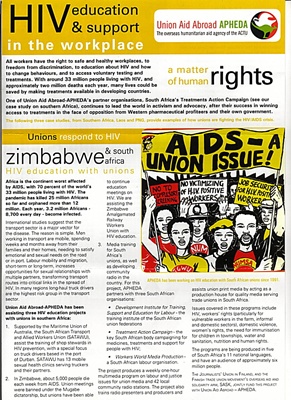


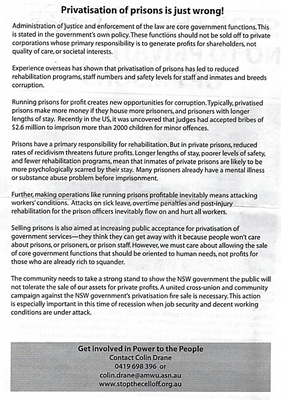

This article is from Socialist Alternative:

A house being built at a protest camp against the NT Intervention will be publicly opened on Sunday 14 February at Honeymoon Bore, near Ampilatwatja.
Alyawarr people from Ampilatwatja walked off their community in July 2009, to get away from the discriminatory controls of the NT Intervention and the raw sewage that was flowing on their streets.
Trade unions from around the country have come in behind the walk-off. Representatives from the CFMEU, AMWU, AWU, LHMU and Unions NT have sent volunteers to help build the house, with donated materials.
Work started on February 3. While in two-and-a-half years the $680 million Intervention housing budget has produced just two houses (and only after the people at Wadeye signed over their land), unionists and local Alyawarr workers have built one in two weeks.
“Through this Intervention and the new ‘hub towns policy’ the government is leaving us to rot. This opening will send a strong message we are here to stay”, said Alyawarr spokesperson Richard Downs.
“Support is really coming in from around the country now. At the launch we will have Aboriginal leaders like Larissa Behrendt, union leaders like Dave Noonan, national secretary of the CFMEU, Anangu Elders coming up from the APY Lands and people from all around thisregion.
“We must unite, draw a line and say the racism and discrimination must stop. And we are demanding from all the Aboriginal leaders, all our organisations – which side are you on? Will you stand with your people?” he concluded.
This is not the first time such a call for support and solidarity has been made by Aboriginal activists and answered by the union movement. The Gurindji equal pay strikers extended their struggle to get back control of their land by setting up camp at Daguragu in the late 1960s. The “union mob”, as they were universally known, helped build houses and toilet blocks, dug gardens, planted trees, and raised money and solidarity from their members in the south. The Ampilatwatja protest house is a symbol of solidarity with the fight against racism and shows that Aboriginal people, not racist governments or bosses, should control their own lives.
Richard Downs and his uncle discuss the house at the protest camp at the walk-off’s blog: http://interventionwalkoff.wordpress.com/video/
Richard Downs will be a featured speaker at Marxism 2010 www.marxism2010.com



Mannie and Kendall Present: LESBIAN AND GAY SOLIDARITY ACTIVISMS
Mannie's weblogs may be accessed directly by clicking on to the following links:
MannieBlog (from 1 August 2003 to 31 December 2005)
Activist Kicks Backs - Blognow archive re-housed - 2005-2009
RED JOS BLOGSPOT (from January 2009 onwards)

This page updated 13 APRIL 2012 and again on 8 MARCH 2022
PAGE NUMBER 55